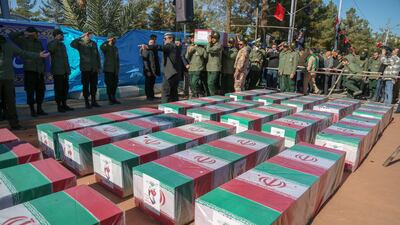Iranian authorities have arrested 32 people suspected of involvement in the twin bomb attack that killed scores of people in Kerman, state media said on Sunday.
Two suicide bombers detonated their explosives as thousands of mourners gathered on Wednesday to commemorate the fourth anniversary of the death of Revolutionary Guard Maj Gen Qassem Suleimani.
ISIS claimed responsibility for the attack, which killed at least 91 people and nearly 300 others, according to the latest toll reported by, Iran's Tasnim news agency.
The state prosecutor in Kerman, Mahdi Bakhshi, told a local TV channel on Saturday that “all terrorists involved in a January 3 attack” in the southern city of Kerman had been arrested, Tasnim reported.
“Thirty-two people have been arrested in [connection with] Kerman [terrorist] crime case and are going through preliminary interrogations,” Tasnim quoted him as saying.
As many as 16 bombs have been discovered throughout Kerman province, Press TV reported.
The prosecutor added 23 would-be ISIS-linked suicide bombers had been arrested in recent months in Kerman province, without elaborating.
As head of the Islamic Revolutionary Guard Corps' overseas operations arm, the Quds Force, Maj Gen Suleimani was the architect of Iran's “axis of resistance” in the region, supervising local militias in Iraq, Syria, Lebanon and Yemen.
ISIS said he “was involved in dozens of massacres of Muslims in Iraq and Syria”.
It said the attack “dealt a strong security blow to the Iranian government … at a time when several parties are trying to promote the Iranian project in the region”.
Maj Gen Suleimani was killed in a US drone strike in Baghdad on January 3, 2020, amid a long-running, low-level conflict between pro-Tehran militias and the US.
American drones fired three missiles at his convoy as it left Baghdad Airport, killing him along with the Iraqi militia leader Abu Mahdi Al Muhandis and several aides.
The US said at the time that Maj Gen Suleimani was planning imminent action against US personnel in Iraq.
The assassination sparked fears of a direct military confrontation between the US and Iran.
There was a flurry of rocket attacks on Iraqi military bases where US troops are stationed. Five days after the killing, Iran fired missiles at an airbase in Iraq housing US troops and another near Erbil in the north, injuring several US troops.


